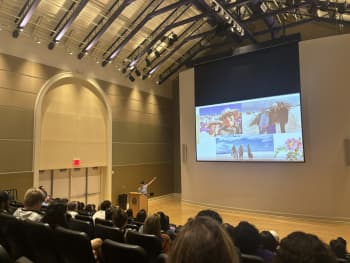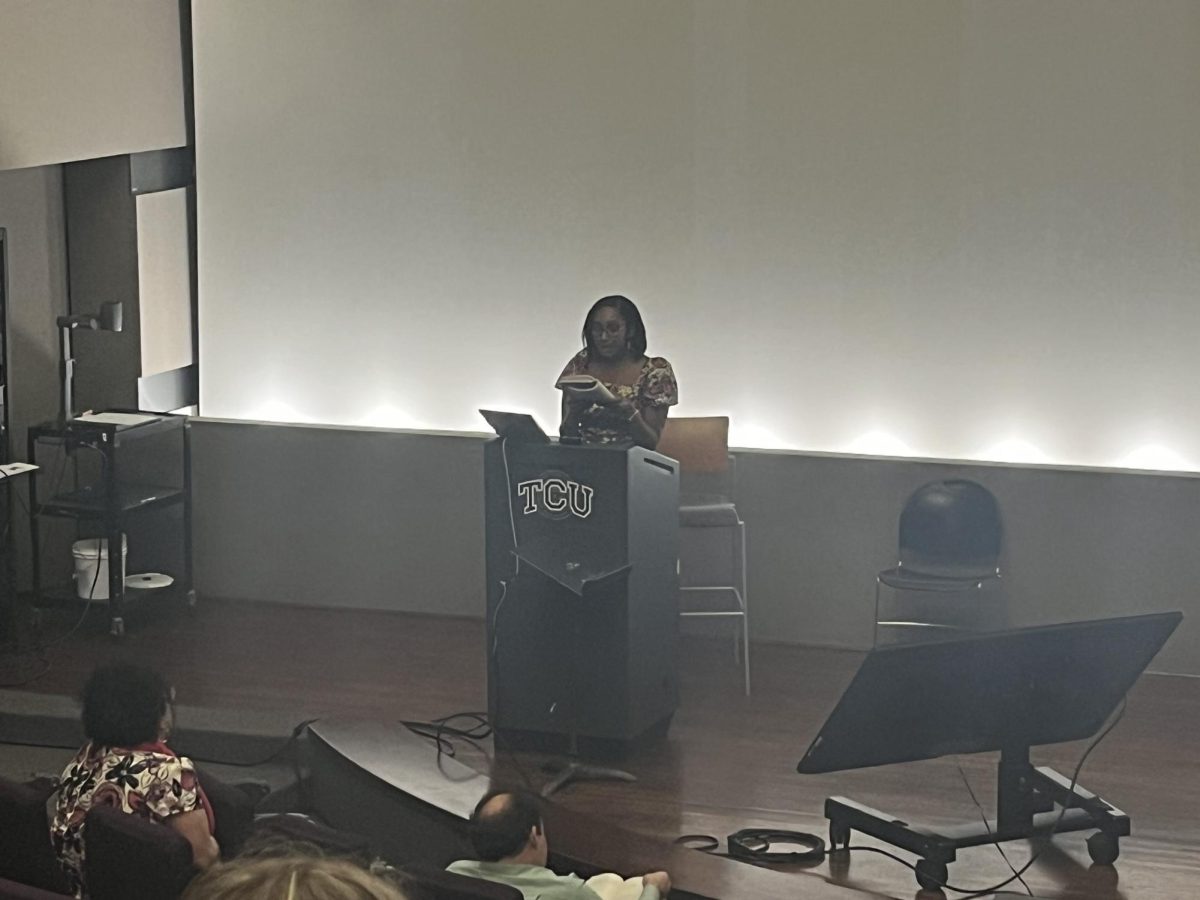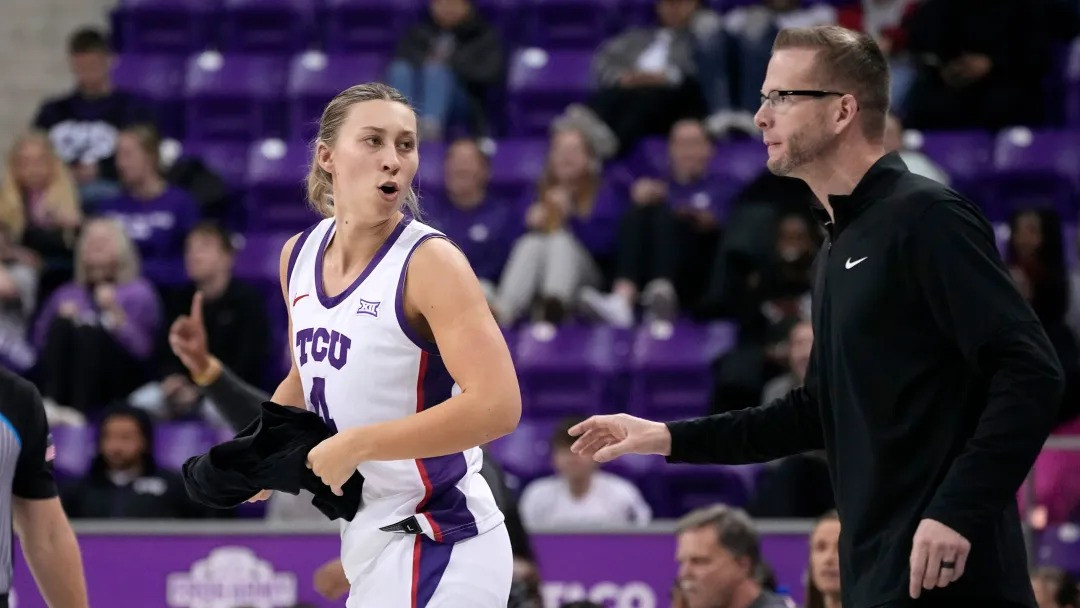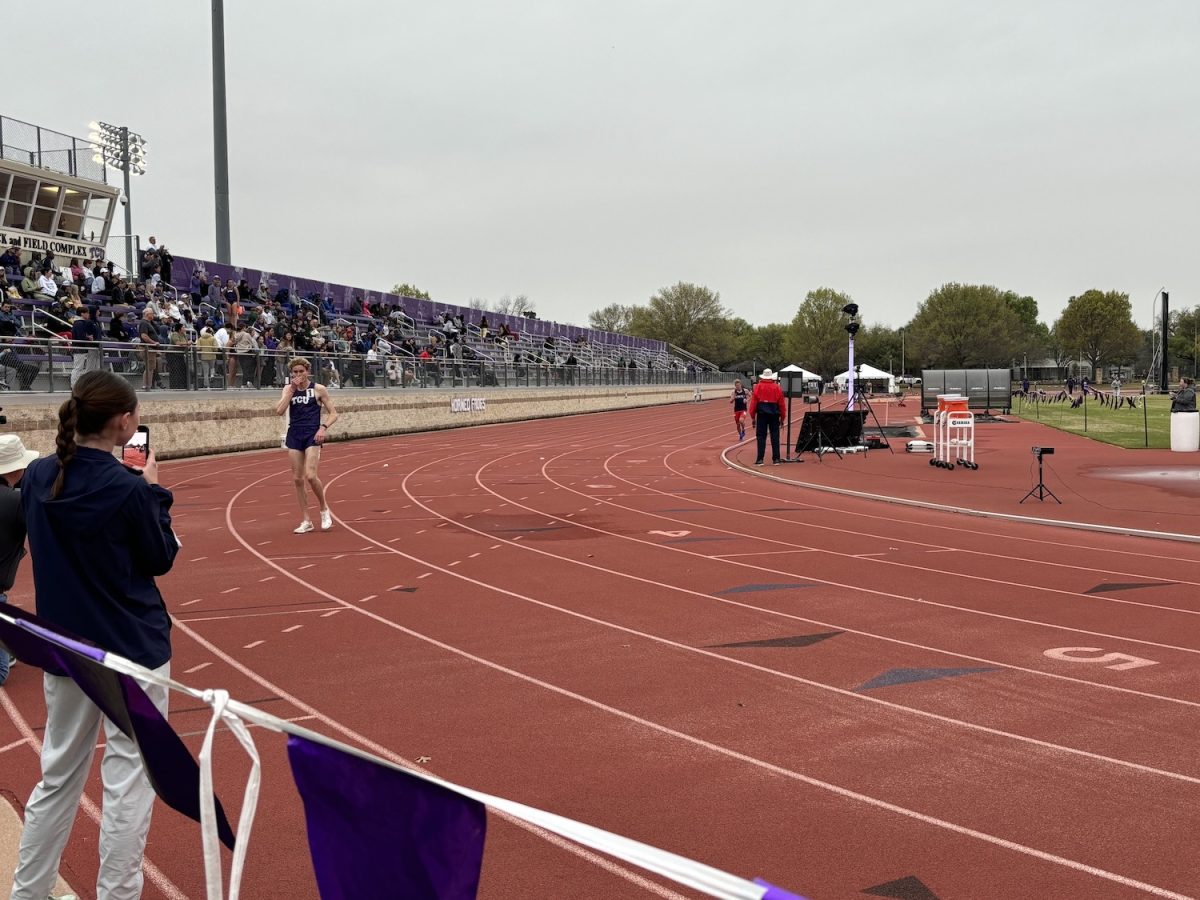Update (6/19): Jane Doe No. 1 received a Notice of Right to Sue from the U.S. Equal Employment Opportunity Commission (EEOC) on June 10, according to a third amended complaint filed June 17. In the complaint, Doe No. 1 alleges TCU violated Title VII of the Civil Rights Act of 1964 by denying her equal opportunities and pay because of her race.
A former and a current member of TCU’s EnglishPhD program havejoined the harassment and discrimination lawsuit against the university, according to an amended complaint filed Wednesday in the U.S. District Court in the Northern District of Texas.
This latest filing comes three weeks after the university filed motions to dismiss the lawsuit, which alleges a pattern of hostility and discrimination at TCU and the John V. Roach Honors College.
According to the suit, Jane Doe No. 4 left the program; Jane Doe No. 5 is still enrolled.
Five black women are claiming there is a pattern of discriminatory behavior toward black students at TCU. Allhave alleged mistreatment by faculty members. They also claim that complaints made to the Title IX office were downplayed, and in some instances, not investigated.
[documentcloud url=”http://www.documentcloud.org/documents/6945224-Doe-2ndAmendedComplaint-June10-Redacted.html” responsive=true sidebar=false]The amended complaint, filed June 10 in the United States District Court in the Northern District of Texas.
“As a practice, TCU does not comment on pending litigation. TCU is focused on creating a respectful and inclusive community for all students.”
A statement from TCU
TCU also filed a status update June 10, listing summaries of each party’s claims and defenses as well as potential scheduling.
Jane Doe No. 4
Before Doe No. 4 started the English PhD program the fall 2015 semester, then-professor Dr. Cedric May, who is black, told her he would provide assistance in any way he could if she decided to attend the university. In addition, the only African American student in the program asked Doe No. 4 if she wanted to enroll at TCU, a “very white” university.
By the time she started classes in the fall, both the professor and the student left TCU, attributing their decisions to discrimination based on race.
Doe No. 4 experienced racist jokes, commentary, assignments and materials in her classes, where she was belittled and interrupted, according to the complaint.
When Doe No. 4 discussed the texts, behavior and remarks with her professors, they were unwilling or unprepared to address the discrimination she experienced, according to the complaint.
Later, the student described in the required First Year Review the stress and trauma she felt in her program. Though her professors responded by acknowledging the racist treatment on the part of her classmates and the need for a supportive environment, they took no action to stop the conduct she had detailed, according to the complaint.
Doe No. 4 experienced sleeplessness and a decreased sense of self-worth, and was unable to finish assignments as a result of her anxiety and trauma, according to the complaint.
In spring 2017, both Doe No. 4 and Doe No. 5 enrolled in the Protest and Violence course, taught by Dr. Brad Lucas, since they assumed the assignments for and topic of the civil rights class would shield them from racist experiences they had encountered in other courses, according to the complaint.
Contrary to their assumptions, the course’s assignments, discussions and presentations contained racist rhetoric. Does Nos. 4 and 5 both said they were discouraged from making their classmates uncomfortable by discussing race, but their classmates were allowed to belittle their work, according to the lawsuit. For example, the women said they often had to explain how the effects of slavery and systematic oppression affect African Americans today.
According to the complaint, Doe No. 4 complained to then-director of graduate studies Dr. Mona Narain about her treatment in Lucas’ class and told her about her concerns regarding Lucas’ presence on her exam committee, given her experiences with him. But Narain told Doe No. 4 removing the professor from the committee would probably cause Lucas, the incoming director of graduate studies, to retaliate.
Later, when Doe No. 4 was applying for a position in the Title IX office in October 2018, Dr. Richard Enos–a professor in the English department–called herunprofessional in an email to the department, and according to the complaint, he later apologized for his behavior.
A few months after that, during Doe No. 4’s last employment interview with the office, Aisha Torrey-Sawyer told the student she “would have to forfeit all of her prior Title IX complaints of discrimination at TCU” if she chose to accept the position, according to the lawsuit.
Experiencing anxiety and stress and following the advice of her physician, Doe No. 4 decided to quit the English PhD program at TCU in January 2019, according to the complaint.
Jane Doe No. 5
Jane Doe No. 5 attended TCU’s Visit Day in 2016, where Jane Doe No. 4 told her that her time at the university had been difficult because of her race and gender, according to the lawsuit.
According to the complaint, Doe No. 5 later talked to Narain about her concerns attending TCU due to its “failed attempts at diversity, equity and inclusion.” Narain said the DEI campaign was evidence that the university had changed to create a productive environment for everyone and encouraged Doe No. 5 to attend.
In her classes, Doe No. 5 experienced insensitive and condescending comments from professors. The treatment by Dr. Karen Steele was so drastic, according to the complaint, that Doe No. 5’s classmates noticed her behavior.
In December 2016, Doe No. 5 visited the Title IX office to learn about what options she had in making a formal complaint against Steele. She told Title IX investigator Leigh Holland about her experiences, and Holland advised Doe No. 5 not to file her complaint until grades were submitted, as poor academic performance would determine whether Steele’s behavior had adversely affected her, according to the lawsuit.
Though Holland fielded the complaint, no one from the Title IX office followed up with Doe No. 5, according to the complaint.
The kind of behavior Doe No. 5 experienced in earlier courses continued into the spring 2017 semester. In Lucas’ Protest and Violence class, Doe No. 5 began to respond to the derogatory comments and questions posed by the plaintiffs’ classmates to give Doe No. 4 a break, as she had become “visibly shrunken,” according to the complaint.
Does Nos. 4 and 5 emailed Lucas, telling him they felt they consistently had to defend themselves and African Americans to contradict racist course materials, according to the complaint. Lucas’ reply acknowledged the assignments were doing little to engage with racism, but he did not work to change his own behavior or that of the other students in the class.
Like Doe No. 4, Doe No. 5 also explained to Narain what she had experienced in Lucas’ class, but neither Narain nor any other representative of TCU instructed the students to formalize their complaints with the Title IX office, according to the lawsuit.
Narain did instruct Doe No. 5 to include in course evaluations complaints of discriminatory behavior, but when she described the treatment she experienced in Dr. Carrie Leverenz’s Teaching College Composition course, Leverenz tried to publicly identify which racial minority had complained, according to the lawsuit.
This left Doe No. 5 feeling isolated and not valued at TCU. She began experiencing tension headaches, her health worsened, and she started to limit her participation at TCU, according to the complaint.
On Jan. 18, 2018, Doe No. 5 wrote a farewell note for her husband and contemplated suicide, though she did not take her own life, according to the complaint.
The same day, Doe No. 4 met with Turner in the Title IX office, asking him to seriously consider the harm to African American women that comes with the racism at TCU. Turner did not investigate her complaints, according to the lawsuit.
In March 2019, Doe No. 4 again visited the Title IX office, where she reported to Holland the issues she had continued to experience at TCU. Doe No. 4 saw Holland taking notes with a pencil and scratch paper and seemingly dismissing her claims, and she asked if she would have to be called the n-word before action would be taken, according to the complaint.
Holland told Doe No. 4 she would have to submit a complaint in writing to formalize the complaint; no investigations were opened, according to the lawsuit.
Two months later, Turner announced in a meeting with the whole English department that the civil rights of Doe No. 4 and other racial minorities had not been violated–even though there had been no investigation–and that an external investigation into the racist climate in the department was about to begin, according to the complaint.
Frustrated with Turner’s unkept promises, Doe No. 4 met with Chancellor Victor Boschini on Nov. 1, 2019, telling him her complaints. Boschini asked the student if she would take a job at TCU if she were offered one, and Doe No. 4 refused the apparent offer to dismiss her complaints in exchange for an employment opportunity and compensation, according to the complaint.
Shared experiences
Jane Does Nos. 4 and 5 co-founded a Reading Group for American and African American literature, according to the lawsuit. Reading groups are required for students in the English PhD program.
While other groups received ample funding to pay for lunch, snacks and other items, Does Nos. 4 and 5 were given $75 to cover costs for the group for the entire year, causing the two women to fund their group, according to the complaint.
Does Nos. 4 and 5 kept contradicting the false and stereotypical representations of African Americans promoted by the university, as well as reporting their experiences to Narain, according to the lawsuit.
Rather than addressing the students’ concerns or directing them to the Title IX office, TCU asked Does Nos. 4 and 5 to include their complaints in course evaluations and gave conferences on diversity that promoted the belief that racial minorities and women should change to be a part of TCU’s environment, according to the lawsuit.
In one meeting, professor David Colon yelled at Doe No. 4 for claiming that the racial minority faculty had not sufficiently addressed the anti-African-American racism that African American students in the department had to experience, according to the complaint. No one apologized to Doe No. 4 until after the conference, though several TCU faculty and staff agreed with Doe No. 4’s claim.
However, a professor at that meeting told Does Nos. 4 and 5 to contact the Title IX office about their complaints. Doe No. 5 wasn’t confident that the office would take any action, and this was confirmed when Narain told Doe No. 4 that she hadn’t recommended the students take their concerns to Title IX in the past because she “knew that Title IX would not do anything,” according to the lawsuit.
In April 2018, Tuner and Holland provided lunch for Does Nos. 4 and 5 as well as other racial minorities in the program, and the students again told them of the racism they had experienced at TCU. The Title IX officers said TCU would help solve the problems the students were facing, but they did nothing, according to the complaint.
As professors in the English department, Does Nos. 4 and 5 had to hold office hours in a shared location in Reed Hall, where their white colleagues would bully them out of the office, according to the complaint. As a result, they began holding office hours in the library, Bookstore or hallways.
In response
The faculty members requested that the investigation report be delivered as soon as possible and that the Title IX office quickly resolve any complaints.
The external investigation by Segal Consulting opened Jan. 13, 2020, after TCU had been informed of the impending lawsuit filed on behalf of Jane Doe No. 1.
In May, Narain and professors in the English department including Linda Hughes, Charlotte Hogg, Alex Lemon, Jason Helms, Stacie McCormick, Rima Abunasser, Ariane Balizet and Theresa Gaul sent a message to Turner to support their racial minority and women students who were met with indifference by the Title IX office.
The faculty members requested that the investigation report be delivered as soon as possible and that the Title IX office quickly resolve any complaints.
“As members of the department’s leadership, we recognize the urgent need to provide an equitable and inclusive departmental climate and culture to sustain a positive learning and working environment for students and faculty. Without resolution of any outstanding complaints, we are substantially hampered in moving forward to take action and make change.”
cite>Faculty members of the English department, in a message to Dr. Darron Turner
The status update filed June 10 on behalf of TCU gives the claims of Does Nos. 1, 2 and 3, as well as statements from TCU and each defendant.
The document also proposes time limits for actions such as for leave to join other parties, to amend the pleadings, to file different kinds of motions and for initial designation of experts.
[documentcloud url="http://www.documentcloud.org/documents/6944109-Doe-2ndAmendedComplaint-June10-1.html" responsive=true sidebar=false]
The status update, filed June 10 in the U.S. District Court in the Northern District of Dallas.
According to the status update, the defendants argue the plaintiffs’ proposed Aug. 16, 2021 trial date is too soon, proposing instead Jan. 17, 2022.











